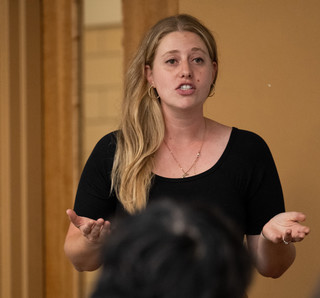Asking for Letters of Recommendation
Your professors are asked to write many such letters during the year, especially fall semester. Your thoughtfulness and careful preparation will help your professor to write the best letter possible. Remember, that you must take responsibility and initiative in the letter-writing process. Professors lead busy lives and you don’t want them to rush through writing your recommendation.
Although professors will vary in their preferences, here are some general guidelines to follow.
Selecting a Professor
- Choose an appropriate professor. Before you choose which professor to ask for a recommendation, ask yourself:
- Does this professor know my name?
- Have I ever spoken to this professor outside of class?
- Did this professor give me a grade of 'B' or higher in the course?
- Have I taken more than one course with this professor?
- You want to choose a professor who can write a letter that includes specifics about your personal characteristics or accomplishments rather than "glittering generalities." The more you can answer "yes" to the questions above, the greater the likelihood you're making a wise choice.
Making Your Request
- Ask the professor in-person
- "ask" - no professor owes you a letter. You are requesting help from that person; make your statement in the form of a request; be willing to take "no" for an answer. The last thing any professor wants to hear is, “I listed you as a reference, so expect a call from my potential employer in the next two weeks.” Frankly, it is rude to assume that someone will recommend you if you don’t first get their permission.
- "in-person" - do not shove the request under an office door or leave in a mailbox or grab the professor in the hallway after class. Ask the professor to write a letter when s/he will have time to discuss this with you, preferably during office hours.
- Ask the professor if s/he would be able to write you a favorable letter of recommendation. If s/he cannot honestly write a favorable letter, you might want to find another professor who will.
- Ask the professor if s/he would be able to write you a specific letter of recommendation. If the professor does not know you well enough to be specific with comments, the letter will not do you much good anyway. Ask someone else.
- As you ask your professor, you may want to include the following information in your conversation (or a follow-up email, once s/he agrees to write a letter)
- why you need a letter of recommendation (what is it you are applying for and why?)
- why you have asked this particular professor for a recommendation?
What to Provide the Professor
- Ample time for the professor to write the letter.
- At least two weeks should be allowed. If letters for graduate school are being requested, provide a list of the application deadlines.
- All the relevant forms and instructions. If the organization provides a form for the letter, give the form to your professor.
- If the organization provides general instructions for preparing letters, make a copy of the instructions for the professor. Highlight the instructions.
- Make sure the professor has the correct address, email, person/organization to whom the letter should be addressed, and the deadline for submitting the letter.
- Your resume/CV and statement of your goals.
- In writing, remind the professor of your major(s) and minor(s), the classes you have taken from her/him, when taken, and the grade received.
- Provide the professor with any information about your participation in the class, projects completed, etc. Help her/him recall your class performance in as much detail as possible.
- Provide the professor with information about internships, independent studies, research projects, etc. in which you have participated.
- Provide the professor with information on some of your college activities, especially leadership positions held and awards won.
- A stamped, addressed, envelope for each letter of recommendation you ask him/her to write (if it must be mailed)
- Before the deadline, verify that the recommendation was received. If not, send a brief, polite email to the professor and offer to pay for overnight delivery (if necessary).
- Follow up the recommendation with a written thank-you note to the professor.
- Writing recommendation letters takes a great deal of time, thought, and effort. Let the professor know you appreciate her/his efforts.
- If the letter does the trick and gets you the position, call the professor to share the good news!
Will you Get a Copy of the Recommendation?
- Please ask the professor if you would like a copy.
- Each professor will have his/her own policy on giving students copies of their recommendations.
- Some professors may be willing to discuss their recommendations with you after they are written.
- Respect the professor's wishes in these matters.
Initially prepared by Dr. Dawn Braithwaite, Department of Communication, University of Nebraska, Lincoln. Updated by Dr. Betsy Bach, Department of Communication Studies, University of Montana.
